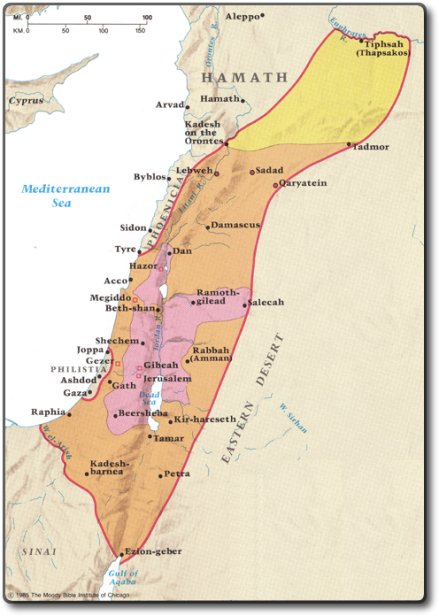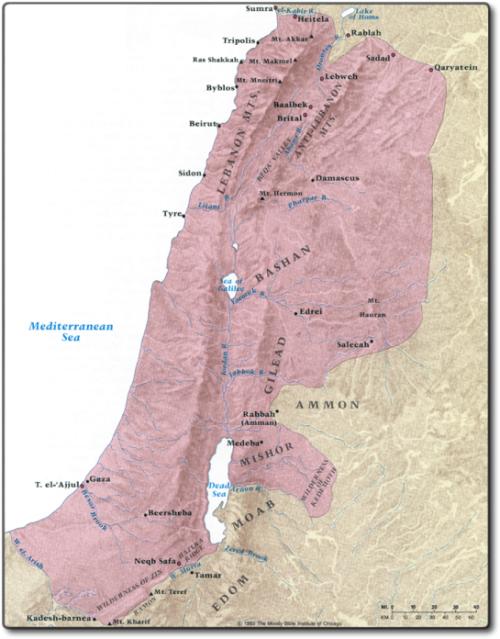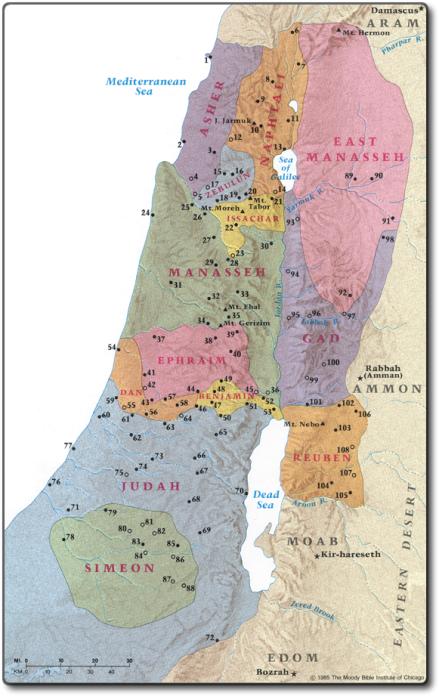
The Promised LandThe promise of land was made to Abraham, and confirmed to Isaac, Jacob, and Jacob's sons. The land that was promised was a central feature in the identity of Israel as a nation, all throughout the Hebrew Scriptures. The unfolding of God's plan primarily involved His people and their inheritance of the land. But are the events recorded in the Old Testament the complete fulfillment of the Abrahamic Covenant? To understand how God's Covenant with Abraham forms the foundation for the rest of the Bible, we must first consider exactly what land God promised to Abraham. We saw in the previous article that God promised blessings, including land, to Abraham and his seed. God was very specific about what land He would give them.
Some commentators believe that the "the river of Egypt" refers to the Nile, while others believe it more likely refers to the Wadi El-Arish, which forms the southwestern border of Israel. Either way, the promised land was to stretch from the River of Egypt in the south to the Euphrates in the north, and include the land then inhabited by the people listed in verses 19-21.
God reiterated this designation of the land in Exodus 23:30-31. Then we read of how the children of Israel had to wanderin the wilderness for forty years because the older generation did not believe God nor trust Him to enable them to overcome the inhabitants and enter the Promised Land. When Moses told the new generation about this and about God's promises, he referred back to the land promise made to Abraham, Isaac, and Jacob (Numbers 32:8-13). He also reiterated the boundaries of the land God would give them (Deuteronomy 1:7; 11:24). God again reiterated the extent of the land to Joshua (Joshua 1:4). Then we read a summary in chapter 21.
These verses present some problems. They seem to say that the land promise to Abraham was completely fulfilled at this time, and thus there is no basis for belief in any future fulfillment. Yet in chapter 23 Joshua says that there are still nations that remain, and that they shall (in the future) possess that land. According to verse 1, this is "a long time after that the Lord had given rest unto Israel from all their enemies round about” and Joshua was “old and stricken in age.”
If they had already possessed and dwelt in “all the land” which God had promised, as 21:43 says, why are they being told to go out and possess more? Similarly, we read further on in chapter 23:
Reading this verse out of context could give one the impression that all of the Abrahamic Covenant had been fulfilled. But if you read the context of Joshua's address in chapter 23, you see that he was saying there was still more to do, and also that if the people went and served other gods, they would be driven from the land. Through the rest of the book of Joshua we read of the Israelites fighting to possess the land and drive out the inhabitants. This struggle continued, in fact, for several hundred years, as we read in the book of Judges. It is clear that there was still much to be done in order to fully possess the land, and yet Joshua 21:43-45 seems to say that they had possessed and dwelt in all the land promised to them, at that point. What then do we make of these verses? Even Calvin said it was an apparent contradiction. There are some who claim that the book of Joshua was deliberately corrupted to make it say that Israel had conquered all the land. Reference is made to Jeremiah 8:8 ("How do ye say, We are wise, and the law of the LORD is with us? Lo, certainly in vain made he it; the pen of the scribes is in vain"). But this verse doesn't mention Joshua specifically, so even if it was saying that the Book of the Law had been corrupted, it doesn't prove this specific corruption. Besides, Jeremiah 8:8 is talking about lying scribes who have twisted the Law and made lies out of it. It is certainly not saying that the sacred Scriptures that were copied and preserved are what was corrupted. There is no proof of any such corruption - in fact textual evidence, especially the Dead Sea Scrolls, indicate an even higher degree of integrity than was previously thought. More to the point, if the verses in Joshua had been purposely changed to say that Israel completely conquered all of the land under Joshua, it would have been caught by any number of scribes, since it flatly contradicts what we read in the rest of the Hebrew Scriptures (even in Joshua itself, as we have seen). What then, is the explanation for the apparent contradiction? I believe it lies in the fact that in many passages, God promises that the children of Israel would possess the land of Canaan, which is only a portion of the promised land elsewhere described as stretching from Euphrates to the River of Egypt. The land of Canaan was what God initially called Abraham to go into, in Genesis 11 and following (Genesis 11:31; 12:5; 13:12). The first mention of the land promise in Genesis speaks of "this land" in the context of Canaan.
The second mention of the land promise is also in the context of Canaan.
It isn't until chapter 15 that God extends the land promise to the Euphrates and the River of Egypt. In fact, this designation is only mentioned in four places (Genesis 15:18; Deuteronomy 1:7; 11:24; Joshua 1:4) while the land of Canaan is referred to by name in many verses. Is (or was) the land of Canaan identical to the land "from the River of Egypt to the Euphrates?" While it is part of that larger area, it is not identical. Back in Genesis 10, when God separated the various nations, the land of the Canaanites was specifically described.
When the children of Israel were wandering in the wilderness, God specifically identified the land of Canaan as the land they would enter and inherit.
It then goes on to describe, in detail, the borders of the land of Canaan (Numbers 34:1-15).
When the land was divided among the Twelve Tribes under Joshua, it was only within the land of Canaan, not the entire land from the River of Egypt to the Euphrates. The borders of the Twelve Tribes are described in detail in Joshua 13-22.
It was only later, under David and Solomon, that the kingdom of Israel was extended to the Euphrates (II Samuel 8:1-3; II Chronicles 9:25-26; I Kings 4:21). So when those verses in Joshua say that all the land that was promised had been taken, it must be referring to the promised land of Canaan, not the entire land from the River of Egypt to the Euphrates. Thus there is no contradiction. The children of Israel's blessings and possession of the land were conditional, based on their keeping the Law of Moses. If they obeyed, they would be blessed, if not, they would be cursed (Leviticus 26; Deuteronomy 28). Specifically, regarding the land, if Israel was faithful to the Mosaic Law, they would be blessed in the land, but if not they would be driven out.
This is the overall picture that must be kept in mind when reading Joshua. While 23:14 speaks of the blessings that had come to pass, the next verses immediately put forth a warning.
Not only did God warn the children of Israel that this could happen, He specifically told Moses that it would in Deuteronomy 31:14-21. And yet He had told the people in the previous chapter that although it would happen, if they just turned back to Him, He would gather them from where they were scattered, and restore them to the land and the blessings that go with it.
As we know from the rest of the history recorded in the Hebrew Scriptures, the people did, in fact, turn to idolatry and wickedness, and although God patiently warned them over and over, eventually (nearly 1000 years later) He removed them from their land (Ezekiel 33:23-29; II Chronicles 36:15-21). Yet in Ezra and Nehemiah we read of the remnant of Judah being restored to the land. But this is still not the end of the story. We read in multiple passages in the Prophets about God's plan to fully restore both Israel and Judah to the land, and the blessings that go with it. We also read of God's promise to establish a New Covenant and change the hearts of His people, as well as the worldwide rule of His Messiah. And all of His promises are based on the foundation of His Covenant with Abraham, which is why those who believe are called the seed of Abraham in the New Testament.
|
E-mail: mclarke@godskingdomfirst.org




